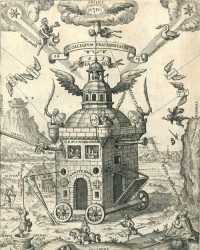Kabbalah
From The Art and Popular Culture Encyclopedia
|
"I affirm, as the main thesis of my concluding labours, that Freemasonry is neither more nor less than Rosicrucianism as modified by those who transplanted it into England. At the beginning of the seventeenth century many learned heads in England were occupied with Theosophy, Cabbalism, and Alchemy: amongst the proofs of this [...] above all [the work] of Robert Fludd. Fludd it was, or whosoever was the author of the Summum Bonum, 1629, that must be considered as the immediate father of Free-masonry, as Andrea was its remote father."--"Historico-critical Inquiry into the Origin of the Rosicrucians and the Freemasons" (1824) by Thomas De Quincey "He began by turning over all his Latin library, after which he re-marshalled the special works of Archelaüs, Albertus Magnus, Raymond Lully and Arnaud de Villanova treating of the kabbala and the occult sciences; lastly he verified, one by one, his modern books and was delighted to find they were all intact, dry and in good condition."--À rebours (1884) by Joris-Karl Huysmans |

Illustration: The Temple of the Rose Cross from the Speculum Sophicum Rhodostauroticum (1618) by Teophilus Schweighardt Constantiens
|
Related e |
|
Featured: |
Kabbalah, literally "receiving/tradition"; also Romanised Cabala, Qabbālâ, etc.; different transliterations now tend to denote alternative traditions) is an esoteric method, discipline, and school of thought.
Kabbalah's definition varies according to the tradition and aims of those following it, from its religious origin as an integral part of Judaism, to its later Christian, New Age, or Occultist syncretic adaptations. Kabbalah is a set of esoteric teachings meant to explain the relationship between an unchanging, eternal, and mysterious Ein Sof (no end) and the mortal and finite universe (God's creation). While it is heavily used by some denominations, it is not a religious denomination in itself. It forms the foundations of mystical religious interpretation. Kabbalah seeks to define the nature of the universe and the human being, the nature and purpose of existence, and various other ontological questions. It also presents methods to aid understanding of these concepts and thereby attain spiritual realisation.
Kabbalah originally developed entirely within the realm of Jewish thought, and kabbalists often use classical Jewish sources to explain and demonstrate its esoteric teachings. These teachings are thus held by followers in Judaism to define the inner meaning of both the Hebrew Bible and traditional Rabbinic literature and their formerly concealed transmitted dimension, as well as to explain the significance of Jewish religious observances.
Traditional practitioners believe its earliest origins pre-date world religions, forming the primordial blueprint for Creation's philosophies, religions, sciences, arts, and political systems. Historically, Kabbalah emerged, after earlier forms of Jewish mysticism, in 12th- to 13th-century Southern France and Spain, becoming reinterpreted in the Jewish mystical renaissance of 16th-century Ottoman Palestine. It was popularised in the form of Hasidic Judaism from the 18th century onwards. 20th-century interest in Kabbalah has inspired cross-denominational Jewish renewal and contributed to wider non-Jewish contemporary spirituality, as well as engaging its flourishing emergence and historical re-emphasis through newly established academic investigation.
See also

